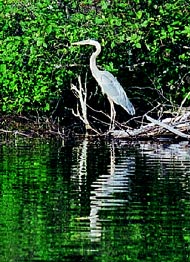Older stories on Resources News
Links to general resource, environmental sites
Links to non-profit environmental/resource groups
Links to environmental/resource news sources
E-mail Resources News
Conservation and Wildlife No Longer a Priority?
Budgets seem to be more important to government than wildlife.
Back in the 1970s, the environment and wildlife was the big issue. People were awakened to the damage being inflicted by human activity on the natural world - they showed they cared - and governments knew they had to listen.
Present day politicians and governments don't seem as concerned about environmental and wildlife issues. U.S. president Bush can push forward development plans for a vital northern wildlife preserve - and say he will not agree to world standards to reduce greenhouse emissions.
This lessened interest in wildlife and the environment can be seen at all levels of government - and around the world. In Virginia, the state is talking of making massive cuts in their Department of Game and Inland Fisheries. Proposed budget cuts of $9 million from the agencies $42 million annual budget could lead to the loss of more than 200 full- and part-time jobs, as well as eliminate dozens of hunting, fishing, and wildlife programs.
Among other things, the department would have to eliminate 94 of 448 full-time jobs and at least 120 of 137 part-time jobs. The number of game wardens would be cut by 25 percent. A wildlife management area would be sold, and a birding and wildlife trail project would be abandoned. As this story is being written, many groups, including Ducks Unlimited, and individuals are opposing the cuts. How much luck they'll have remains to be seen.
Across the Atlantic ocean in Africa, gorilla's in Cameroon are another source of concern for people who care about wildlife. In as little as ten years, conservationists say, the world's second-biggest tropical forest could be emptied of Africa's great apes - gorillas, chimpanzees and bonobos.
Bushmeat trading is banned in Cameroon, but up to 90 tonnes of meat arrive at Yaoundé's four bushmeat markets each month. Forest-dwelling Cameroonians have always eaten ape, but what is new is the urban population's reawakened appetite for bushmeat since European loggers began constructing roads deep into the rainforest. Loggers traditionally have little time for law enforcement. Some companies actively encourage illegal hunting in order to feed their workforce.
Cameroon's lack of interest in wildlife management goes deep. Bushmeat is served up at state functions - local officials might feel snubbed if served anything other than gorilla stew. For the rural poor struggling on less than $2 a day, the bushmeat trade is an important source of income. A large gorilla can earn the hunter $60, a chimp, $35. According to one estimate, 800 gorillas are poached in the south-eastern corner of Cameroon every year.
A string of international initiatives has tried to tackle the bushmeat crisis. But all have foundered on Cameroon's indifference, and the reluctance of outsiders to press their point home with economic incentives and penalties.
By law, logging is restricted to 2,500 hectares (6,200 acres) a year on any concession. If enforced, this restriction would prevent vast tracts of forest being opened to hunters, and allow animals to move safely out of logged areas. But the law is often ignored.
Most conservationists now concede that there is not much hope for Cameroon's wildlife outside the protected areas, which account for about 10% of the forests. Even here the hope is frail. Southern Cameroon's vast Dja reserve is a Unesco World Heritage site and World Biosphere reserve. But it is also home to some 100 hunting camps.
